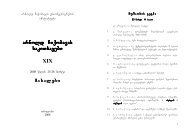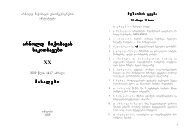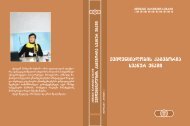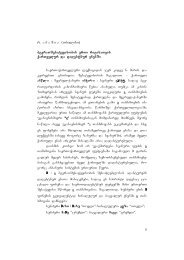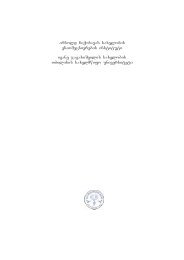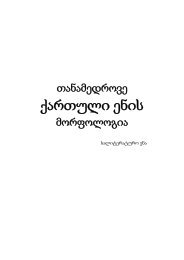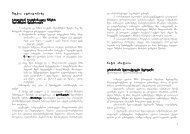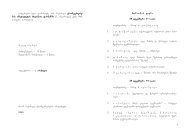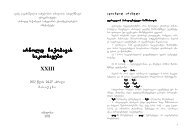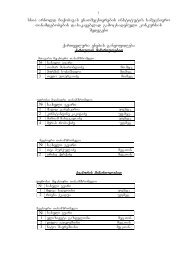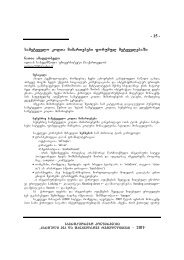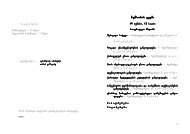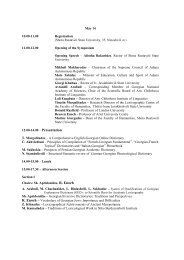- Page 1 and 2:
iberiul-kavkasiuri enaTmecniereba X
- Page 3 and 4:
ARN. CHIKOBAVA INSTITUTE OF LINGUIS
- Page 5 and 6:
mTavari redaqtori vaja Sengelia sar
- Page 7 and 8: S i n a a r s i _ CONTENTS g. k v a
- Page 9 and 10: S i n a a r s i 7 m. s a G l i a n
- Page 11 and 12: XXXIX 2011 iberiul-kavkasiuri enaTm
- Page 13 and 14: `Kovel poezias waayarbebda~ simon j
- Page 15 and 16: `Kovel poezias waayarbebda~ ...ar i
- Page 17 and 18: iberiul-kavkasiuri enaTmecniereba X
- Page 19 and 20: akademikosi qeTevan lomTaTiZe da ib
- Page 21 and 22: akademikosi qeTevan lomTaTiZe da ib
- Page 23 and 24: akademikosi qeTevan lomTaTiZe da ib
- Page 25 and 26: akademikosi qeTevan lomTaTiZe da ib
- Page 27 and 28: akademikosi qeTevan lomTaTiZe da ib
- Page 29 and 30: akademikosi qeTevan lomTaTiZe da ib
- Page 31 and 32: Cveni maswavlebeli 29 - Нет, я
- Page 33 and 34: Cveni maswavlebeli 31 sergei pazovi
- Page 35 and 36: Cveni maswavlebeli 33 Lomtatidze’
- Page 37 and 38: mcire mogoneba qeTevan lomTaTiZeze
- Page 39 and 40: iberiul-kavkasiuri enaTmecniereba X
- Page 41 and 42: predikatuli sintagma da sintaqsuri
- Page 43 and 44: predikatuli sintagma da sintaqsuri
- Page 45 and 46: predikatuli sintagma da sintaqsuri
- Page 47 and 48: predikatuli sintagma da sintaqsuri
- Page 49 and 50: predikatuli sintagma da sintaqsuri
- Page 51 and 52: Tavazianobis etiketi da mesame piri
- Page 53 and 54: Tavazianobis etiketi da mesame piri
- Page 55 and 56: Tavazianobis etiketi da mesame piri
- Page 57: Tavazianobis etiketi da mesame piri
- Page 61 and 62: Tuli Tanwyobili winadadebis definic
- Page 63 and 64: Tuli Tanwyobili winadadebis definic
- Page 65 and 66: Tuli Tanwyobili winadadebis definic
- Page 67 and 68: naTesaobiTi brunvis alomorfTa ganaw
- Page 69 and 70: naTesaobiTi brunvis alomorfTa ganaw
- Page 71 and 72: naTesaobiTi brunvis alomorfTa ganaw
- Page 73 and 74: naTesaobiTi brunvis alomorfTa ganaw
- Page 75 and 76: naTesaobiTi brunvis alomorfTa ganaw
- Page 77 and 78: iberiul-kavkasiuri enaTmecniereba X
- Page 79 and 80: 76 adgilis zmnisarTebi svanur diale
- Page 81 and 82: 78 adgilis zmnisarTebi svanur diale
- Page 83 and 84: 80 Temis sakiTxisaTvis III seriis f
- Page 85 and 86: 82 Temis sakiTxisaTvis III seriis f
- Page 87 and 88: 84 Temis sakiTxisaTvis III seriis f
- Page 89 and 90: 86 III kavSirebiTi _ gav-zrd-ode ga
- Page 91 and 92: 88 Temis sakiTxisaTvis III seriis f
- Page 93 and 94: poetur-stilistikuri Taviseburebebis
- Page 95 and 96: poetur-stilistikuri Taviseburebebis
- Page 97 and 98: poetur-stilistikuri Taviseburebebis
- Page 99 and 100: poetur-stilistikuri Taviseburebebis
- Page 101 and 102: iberiul-kavkasiuri enaTmecniereba X
- Page 103 and 104: 98 zogi zmnuri fuZe da zmniswinis s
- Page 105 and 106: 100 zogi zmnuri fuZe da zmniswinis
- Page 107 and 108: 102 zogi zmnuri fuZe da zmniswinis
- Page 109 and 110:
faringalizaciis sakiTxisaTvis udiur
- Page 111 and 112:
faringalizaciis sakiTxisaTvis udiur
- Page 113 and 114:
faringalizaciis sakiTxisaTvis udiur
- Page 115 and 116:
faringalizaciis sakiTxisaTvis udiur
- Page 117 and 118:
faringalizaciis sakiTxisaTvis udiur
- Page 119 and 120:
faringalizaciis sakiTxisaTvis udiur
- Page 121 and 122:
faringalizaciis sakiTxisaTvis udiur
- Page 123 and 124:
iberiul-kavkasiuri enaTmecniereba X
- Page 125 and 126:
subkategoriebisTvis svanur enaSi 11
- Page 127 and 128:
subkategoriebisTvis svanur enaSi 12
- Page 129 and 130:
subkategoriebisTvis svanur enaSi 12
- Page 131 and 132:
subkategoriebisTvis svanur enaSi 12
- Page 133 and 134:
T. maxarobliZe 127 Ti SexedviT, sak
- Page 135 and 136:
T. maxarobliZe 129 bis safuZvelze.
- Page 137 and 138:
T. maxarobliZe 131 magaliTad, zogad
- Page 139 and 140:
C. Names of organizations and firms
- Page 141 and 142:
nasesxeli frazeologizmebis struqtur
- Page 143 and 144:
nasesxeli frazeologizmebis struqtur
- Page 145 and 146:
nasesxeli frazeologizmebis struqtur
- Page 147 and 148:
nasesxeli frazeologizmebis struqtur
- Page 149 and 150:
nasesxeli frazeologizmebis struqtur
- Page 151 and 152:
nasesxeli frazeologizmebis struqtur
- Page 153 and 154:
nasesxeli frazeologizmebis struqtur
- Page 155 and 156:
nasesxeli frazeologizmebis struqtur
- Page 157 and 158:
nasesxeli frazeologizmebis struqtur
- Page 159 and 160:
nasesxeli frazeologizmebis struqtur
- Page 161 and 162:
nasesxeli frazeologizmebis struqtur
- Page 163 and 164:
iberiul-kavkasiuri enaTmecniereba X
- Page 165 and 166:
svanur frazeologiur gamonaTqvamTa l
- Page 167 and 168:
svanur frazeologiur gamonaTqvamTa l
- Page 169 and 170:
svanur frazeologiur gamonaTqvamTa l
- Page 171 and 172:
svanur frazeologiur gamonaTqvamTa l
- Page 173 and 174:
iberiul-kavkasiuri enaTmecniereba X
- Page 175 and 176:
pasiuri da saurTierTo seamantika ga
- Page 177 and 178:
pasiuri da saurTierTo seamantika ga
- Page 179 and 180:
pasiuri da saurTierTo seamantika ga
- Page 181 and 182:
pasiuri da saurTierTo seamantika ga
- Page 183 and 184:
iberiul-kavkasiuri enaTmecniereba X
- Page 185 and 186:
O dp {-en}(/-en/~/-n) da O dp {-T}(
- Page 187 and 188:
O dp {-en}(/-en/~/-n) da O dp {-T}(
- Page 189 and 190:
O dp {-en}(/-en/~/-n) da O dp {-T}(
- Page 191 and 192:
O dp {-en}(/-en/~/-n) da O dp {-T}(
- Page 193 and 194:
O dp {-en}(/-en/~/-n) da O dp {-T}(
- Page 195 and 196:
O dp {-en}(/-en/~/-n) da O dp {-T}(
- Page 197 and 198:
O dp {-en}(/-en/~/-n) da O dp {-T}(
- Page 199 and 200:
O dp {-en}(/-en/~/-n) da O dp {-T}(
- Page 201 and 202:
iberiul-kavkasiuri enaTmecniereba X
- Page 203 and 204:
marcvlis gaxsnasTan dakavSirebuli s
- Page 205 and 206:
marcvlis gaxsnasTan dakavSirebuli s
- Page 207 and 208:
mravalgzisobis gamoxatva qarTuli en
- Page 209 and 210:
mravalgzisobis gamoxatva qarTuli en
- Page 211 and 212:
iberiul-kavkasiuri enaTmecniereba X
- Page 213 and 214:
dalocvisa da wyevla-muqaris gamomxa
- Page 215 and 216:
dalocvisa da wyevla-muqaris gamomxa
- Page 217 and 218:
dalocvisa da wyevla-muqaris gamomxa
- Page 219 and 220:
dalocvisa da wyevla-muqaris gamomxa
- Page 221 and 222:
dalocvisa da wyevla-muqaris gamomxa
- Page 223 and 224:
qarTuli enis samxruli dialeqtebi ko
- Page 225 and 226:
qarTuli enis samxruli dialeqtebi ko
- Page 227 and 228:
qarTuli enis samxruli dialeqtebi ko
- Page 229 and 230:
qarTuli enis samxruli dialeqtebi ko
- Page 231 and 232:
qarTuli enis samxruli dialeqtebi ko
- Page 233 and 234:
qarTuli enis samxruli dialeqtebi ko
- Page 235 and 236:
qarTuli enis samxruli dialeqtebi ko
- Page 237 and 238:
iberiul-kavkasiuri enaTmecniereba X
- Page 239 and 240:
qarTuli idiomatikonis lingvistur-le
- Page 241 and 242:
iberiul-kavkasiuri enaTmecniereba X
- Page 243 and 244:
`vefxistyaosnis~ avtoris sadaurobis
- Page 245 and 246:
`vefxistyaosnis~ avtoris sadaurobis
- Page 247 and 248:
iberiul-kavkasiuri enaTmecniereba X
- Page 249 and 250:
fuZedrekad zmnaTa mimGeoburi formeb
- Page 251 and 252:
fuZedrekad zmnaTa mimGeoburi formeb
- Page 253 and 254:
fuZedrekad zmnaTa mimGeoburi formeb
- Page 255 and 256:
arsebiT saxelTa dajgufebis axali pr
- Page 257 and 258:
arsebiT saxelTa dajgufebis axali pr
- Page 259 and 260:
iberiul-kavkasiuri enaTmecniereba X
- Page 261 and 262:
k. vamlingi, rus. enaze). m u x a d
- Page 263 and 264:
iberiul-kavkasiuri enaTmecniereba X
- Page 265 and 266:
« Il n’y a pas de petites cultur
- Page 267 and 268:
`ar arseboben patara kulturebi~ (gi
- Page 269 and 270:
`ar arseboben patara kulturebi~ (gi
- Page 271 and 272:
`ar arseboben patara kulturebi~ (gi
- Page 273 and 274:
g i o r g i S a r a S i Z e 267 194
- Page 275 and 276:
g i o r g i S a r a S i Z e 269 _ u
- Page 277 and 278:
g i o r g i S a r a S i Z e 271 _ a
- Page 279 and 280:
m i x e i l q u r d i a n i riv pro
- Page 281 and 282:
m i x e i l q u r d i a n i Tis mec
- Page 283 and 284:
l a m a r a n o z a Z e namSromeli.
- Page 285 and 286:
l a l i i o r d a n i S v i l i li



